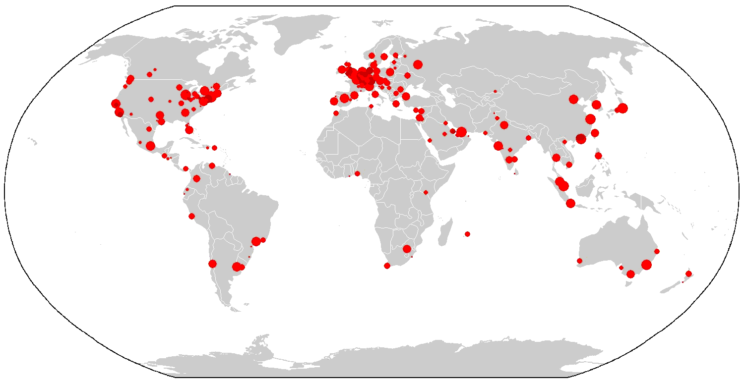
This is a summary of and commentary on the prologue titled “The Metropolitan Explosion” of Peter Hall’s (1966), “The World Cities”.
Although the defining elements of his “World City” remain unchanged, a major shift has been in manufacturing (element # 4b) in urban suburbs. The World Cities are gradually leaving behind the role of being hub for the dissemination of (imported and exported) goods, and specializing in technological, financial, and human “resource management”. That is not to suggest that World Cities are no longer ports (element # 2) (e.g. Istanbul, Shanghai, etc.), but being a port city is no longer a necessary condition for being a World City. Neither is being “center of political power” (element # 1) (e.g. New York, San Fransisco, etc.). However, the most fundamental defining element of being a “World City” is being a mecca for “riches” (element # 4) and “talent” (element # 3). Hence, a “World City” is a increasingly defined in terms of the concentration of “financial and human capital” instead of “manufacturing and political capital”.
Hall’s question: “By what characteristics do we distinguish the world cities from other great centers of population and wealth?”
It is clear from the question that what a World City is not: simply a concentration of population and wealth (unless it is capital to be invested in profit making ventures: e.g. Riyadh or Monaco).
Hall’s Criteria for being a World City (my addition in parenthesis):
- Being a major political center (local and global)
- Seat of the powerful governments and (inter-)national organizations
- Being a center for trade (and corollary transport and finances)
- major sea and air-port linked with road networks
- A major banking and financial center
- Being a center for talent (and corollary knowledge and information)
- Research and Education
- Major hospitals, great universities, research and specialized institutions
- Place where information is gathered and disseminated
- headquarter of radios and television, major publishing houses
- Research and Education
- Being a center for wealth
- Luxury industry and specialized shops for super-rich
- Manufacturing in suburbs (now almost outdated)
- Major entertainment centers, opera houses, clubs, creatures
In the long views, some World Cities decline while others emerge as a consequence of the process of economic adaption. White collar jobs grow more rapidly than blue collar jobs as a army of middle managers is required to manage the resources of wealth generation.
World City is also called Global City in the vocab of Globalization. See more: https://en.wikipedia.org/wiki/Global_city